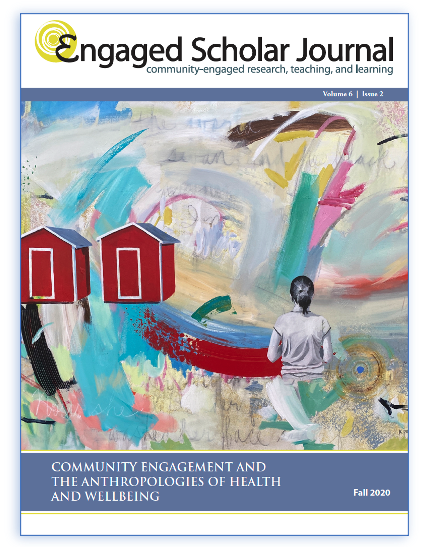A Campus-Wide Community-Engaged Learning Study: Insights and Future Directions
DOI:
https://doi.org/10.15402/esj.v6i2.70729Keywords:
community-enaged learning, undergraduate education, university-community relations, service-learningAbstract
The authors undertook a campus-wide scan of community-engaged learning (CEL) initiatives at a large University. With collaboration from staff and leadership of the campus Centre For Community-Engaged Learning, the researchers designed an open-ended qualitative interview and questionnaire for senior administrators and faculty leaders across all local undergraduate faculties. Guiding questions for this project included: How do the various faculties and schools within the university define their relationship with community? What activities are considered CEL? How do students engage in these activities? What are the benefits of engaging with community? From these came specific interview questions that were administered to senior administration from each faculty, and further interviews were sought with identified faculty leaders. Findings are listed by faculty, with examples and definitions, and a concluding section offers insights and discussion around strategies to strengthen and enhance CEL.
References
Abdul-Raheem, J. (2018). Cultural humility in nursing education. Journal of Cultural Diversity, 25(2), 66-73.
Armitage, T., & Levac, L. (2015). Learning the development of community-engaged scholars through course-based learning: A student perspective. Engaged Scholar Journal: Community-Engaged Research, Teaching, and Learning, 1(1), 148-163. https://doi.org/10.15402/esj.v1i1.25
Bragg, B., & Lund, D. E. (2015, June). Community-engaged learning scan: University of Calgary [final research report]. Calgary, AB: Werklund School of Education & Centre for Community-Engaged Learning.
Butin, D. W. (2010). Service-learning in theory and practice: The future of community engagement in higher education. Palgrave McMillan.
Cheng, J., Muhajarine, N., McMullen, L., & Dunlop, A. (2015). Measuring capacity for community-engaged scholarship: Results from an institutional self-assessment at the University of Saskatchewan. Engaged Scholar Journal: Community-Engaged Research, Teaching, and Learning, 1(2), 197-214. https://doi.org/10.15402/esj.v1i2.108
Cooper, J. R. (2014). Ten years in the trenches: Faculty perspectives on sustaining service-learning. Journal of Experiential Education, 37(4), 415-428. https://doi.org/10.1177/1053825913513721
Creswell, J. W. (2013). Qualitative inquiry and research design: Choosing among five approaches (3rd ed.). Sage.
De Leon, N. (2014). Developing intercultural competence by participating in intensive intercultural service-learning. Michigan Journal of Community Service Learning, 21(1), 17-30.
Hatcher, J. A., & Bringle, R. G. (Eds.). (2012). Understanding service-learning and community engagement: Crossing boundaries through research. Information Age.
Kajner, T., Chovanec, D., Underwood, M., & Mian, A. (2013). Critical community service-learning: Combining critical classroom pedagogy with activist community placements. Michigan Journal of Community Service Learning, 19(2), 36-48.
Lee, L., & Lund, D. E. (2016). Infusing service-learning with social justice through cultural humility. In A. S. Tinkler, B. E. Tinkler, J. R. Strait, & V. M. Jagla (Eds.), Service-learning to advance social justice in a time of radical inequality (pp. 359-381). Information Age.
Lund, D. E. (Ed.). (2018). The Wiley international handbook of service-learning for social justice. Wiley-Blackwell.
Lund, D. E., & Lee, L. (2015). Fostering cultural humility among pre-service teachers: Connecting with children and youth of immigrant families through service-learning. Canadian Journal of Education, 38(2), 1-30. Retrieved from http://www.cje-rce.ca/index.php/cje-rce/article/view/1744/1756
Mitchell, T. D. (2010). Challenges and possibilities: Linking social justice and service-learning. Michigan Journal of Community Service Learning, 17(1), 94-97.
Moely, B., & Ilustre, V. (2014). The impact ofsService-learning course characteristics on university students' learning outcomes. Michigan Journal of Community Service Learning, 21(1), 5-16.
National Survey of Student Engagement. (2013). NSSE Research brief #1: Promoting high-impact practices: Maximizing educational gains. Bloomington, IN: Indiana University Center for Postsecondary Research. Retrieved from http://nsse.indiana.edu/pdf/HIP_brief_final.pdf
O'Meara, K., Lounder, A., & Hodges, A. (2013). University leaders' use of episodic power to support faculty community engagement. Michigan Journal of Community Service Learning, 19(1), 5-20.
Przednowek, A., Goemans, M., & Wilson, A. (2018). "I had a big revelation": Student experiences in community-first community-campus engagement. Engaged Scholar Journal, 4(2), 21-41. https://doi.org/10.15402/esj.v4i2.61746
Tinkler, A. S., & Tinkler, B. E. (2017). Community conversations shape reciprocal partnerships for social justice: A case study of a comprehensive service-learning initiative in a teacher education program. International Journal of Research on Service-Learning in Teacher Education, 5, 1-12.
Tinkler, A. S., Tinkler, B. E., Strait, J. R., & Jagla, V. M. (Eds.). (2016). Service-learning to advance social justice in a time of radical inequality. Information Age.
University of Calgary. (2011). Eyes High Strategic Direction. Calgary, AB: University of Calgary. Retrieved from https://issuu.com/devoff/docs/eyes_high
Published
How to Cite
Issue
Section
License
Authors who publish with this journal agree to the following terms:
- Authors retain copyright and grant the journal right of first publication with the work simultaneously licensed under a Creative Commons Attribution License CC BY 4.0 that allows others to share the work with an acknowledgement of the work's authorship and initial publication in this journal.
- Authors are able to enter separate, additional contractual agreements for the non-exclusive distribution of the journal's published version of the work (e.g., post it to an institutional repository or publish it in a book), with an acknowledgement of its initial publication in this journal.
- Authors are permitted to post their work online (e.g., in an institutional repository or on their website) after the publication of their work in the Engaged Scholar Journal.
- Please note that while every opportunity will be taken to ensure author participation in the editing process, due to time constraints final copyediting changes may be made before publication to ensure APA adherence throughout all submissions.




